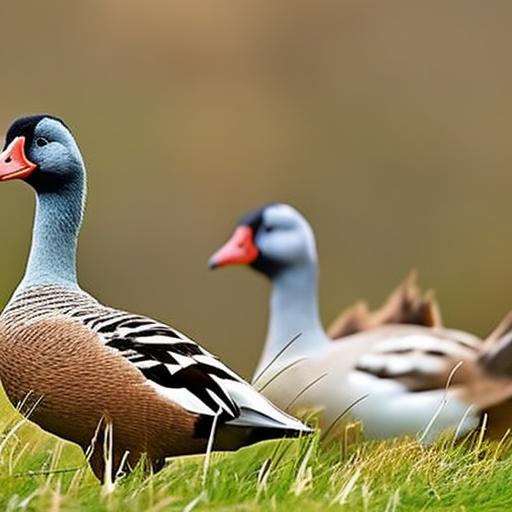Geese have been a staple on homesteads for centuries. They were originally domesticated in ancient Egypt and have since been kept for their meat, eggs, feathers, and even as watchdogs. Today, keeping geese on a modern homestead offers a range of benefits. They are excellent foragers, helping to control pests and weeds in the garden. They also provide a sustainable source of meat and eggs, and their feathers can be used for crafts or sold. Additionally, geese can serve as effective watchdogs, alerting you to any potential threats on your property.
Key Takeaways
- Keeping geese on a modern homestead can be a rewarding and profitable venture.
- Choosing the right breed of geese for your homestead is important for their health and productivity.
- Proper housing and fencing is necessary to keep geese safe and secure on your property.
- Providing optimal feeding and watering for geese is crucial for their overall health and well-being.
- Understanding geese behavior and social habits can help you better care for and raise them on your homestead.
Types of Geese: Choosing the Right Breed for Your Homestead
There are several popular breeds of geese that are well-suited for homesteads. The Toulouse goose is one of the most common breeds, known for its large size and calm temperament. The Embden goose is another popular choice, prized for its meat production and white feathers. The African goose is known for its excellent egg-laying abilities, while the Chinese goose is smaller in size and often kept for ornamental purposes.
When choosing a breed of geese for your homestead, it’s important to consider factors such as climate, space availability, and your specific needs. Some breeds are better suited to colder climates, while others thrive in warmer regions. Additionally, certain breeds may require more space to roam than others. It’s also important to consider whether you are primarily interested in meat production, egg-laying capabilities, or both.
Housing and Fencing for Geese on Your Property
Geese require adequate housing and fencing to keep them safe and secure on your property. When it comes to housing, there are several options to consider. A simple shelter made of wood or metal can provide protection from the elements and predators. It should be well-ventilated and have enough space for the geese to move around comfortably. Some homesteaders also opt for portable shelters, which can be moved around the property to allow the geese access to fresh grazing areas.
Fencing is essential for keeping geese contained and safe from predators. A sturdy fence that is at least four feet high is recommended, as geese are excellent flyers and can easily escape if the fence is too low. Electric fencing can also be effective in deterring predators. It’s important to regularly inspect the fencing for any damage or weak spots, as geese can be quite resourceful when it comes to finding ways to escape.
Feeding and Watering Geese: Tips for Optimal Health
Proper nutrition is crucial for the health and well-being of your geese. They require a balanced diet that includes a mix of grains, greens, and protein. Commercially available goose feed can provide the necessary nutrients, but it’s important to supplement their diet with fresh greens and vegetables. Geese are excellent grazers and will happily munch on grass, weeds, and other vegetation in your garden.
In addition to feeding, providing clean and fresh water is essential for geese. They require access to water for drinking, bathing, and even mating. A shallow pool or pond is ideal for geese to swim and bathe in, but if you don’t have access to a natural water source, a large tub or kiddie pool can suffice. It’s important to regularly clean and refill the water source to prevent the spread of bacteria or parasites.
Geese Behavior: Understanding Their Social Habits
Geese are highly social animals that form strong bonds with their flock mates. They have a hierarchical social structure, with one dominant goose leading the group. Understanding their social habits can help you interact with them more effectively. It’s important to establish yourself as the leader of the flock by being calm, confident, and consistent in your interactions with them.
Geese communicate with each other through a range of vocalizations and body language. They honk to alert the flock of potential threats or to communicate with each other. They also use body language, such as head bobbing and wing flapping, to express their emotions. It’s important to observe and learn their communication cues to better understand their needs and behaviors.
When interacting with geese, it’s important to approach them slowly and calmly. Avoid sudden movements or loud noises, as this can startle them. It’s also important to respect their personal space and avoid crowding or cornering them. Building trust and establishing a positive relationship with your geese will make it easier to handle them and ensure their well-being.
Geese Egg Laying: How to Encourage and Collect Eggs

Geese are seasonal layers, meaning they typically lay eggs in the spring and early summer. However, there are several factors that can affect their egg-laying capabilities. Providing a comfortable and secure nesting area is essential for encouraging geese to lay eggs. A simple nest box filled with straw or shavings can provide a cozy spot for them to lay their eggs.
To encourage egg laying, it’s important to provide a balanced diet that includes enough protein and calcium. Supplementing their diet with crushed oyster shells or calcium-rich foods can help ensure they have the necessary nutrients for egg production. It’s also important to provide a stress-free environment, as stress can inhibit egg laying.
Collecting goose eggs should be done regularly to prevent them from becoming dirty or damaged. It’s best to collect the eggs daily or every other day, depending on the number of geese you have. Goose eggs can be stored in a cool and dry place for up to a month, but it’s important to check them regularly for any signs of spoilage.
Hatching and Raising Goslings: A Guide for Beginners
If you’re interested in hatching and raising goslings, there are a few things to consider. Geese have a natural instinct to incubate their eggs, but if you don’t have a broody goose, you can use an incubator to hatch the eggs. The incubation period for goose eggs is around 28-35 days, depending on the breed.
Once the goslings hatch, they will need a warm and safe environment to grow. A brooder box or pen with a heat lamp can provide the necessary warmth. It’s important to monitor the temperature and adjust the heat lamp accordingly to ensure the goslings are comfortable.
Feeding goslings is similar to feeding adult geese, but they require a higher protein content in their diet. Commercially available chick starter feed can provide the necessary nutrients for their growth. It’s also important to provide fresh water at all times.
Geese Health and Common Ailments: Prevention and Treatment
Geese are generally hardy birds, but they can still be susceptible to certain health issues. Common ailments in geese include respiratory infections, parasites, and foot problems. It’s important to take preventative measures to keep your geese healthy, such as providing a clean and dry living environment, regular deworming, and proper nutrition.
If you notice any signs of illness in your geese, it’s important to seek veterinary care as soon as possible. Early detection and treatment can help prevent the spread of disease and ensure the well-being of your flock. It’s also important to quarantine any sick birds to prevent the spread of illness to the rest of the flock.
Geese as Watchdogs: Protecting Your Homestead from Predators
Geese have a natural instinct to protect their territory and flock, making them excellent watchdogs for your homestead. They have keen eyesight and hearing, and will alert you to any potential threats or intruders. Their loud honking can be quite intimidating to predators, and they will often chase them away.
To train geese to be effective watchdogs, it’s important to socialize them from a young age. Regular handling and positive interactions with humans can help build trust and confidence. It’s also important to expose them to different sounds and sights to desensitize them to potential threats.
Selling Geese and Their Products: A Profitable Venture for Your Homestead
Keeping geese on your homestead can also be a profitable venture. In addition to selling geese for meat, there are several other products that can be sold. Goose eggs are highly sought after by bakers and chefs, and can be sold at a premium price. Feathers from geese can be used for crafts or sold to artisans. Additionally, geese can be rented out as natural weed control for gardens or vineyards.
When it comes to marketing your geese and their products, it’s important to identify your target market and develop a marketing strategy. Local farmers markets, online platforms, and word-of-mouth referrals can all be effective ways to sell your products. It’s also important to provide high-quality products and excellent customer service to build a loyal customer base.
Keeping geese on a modern homestead offers a range of benefits, from pest control and sustainable food production to protection and potential profit. By choosing the right breed, providing proper housing and fencing, understanding their behavior, and taking care of their health needs, you can successfully integrate geese into your homestead. Whether you’re looking for a source of meat and eggs or want a natural watchdog for your property, geese can be a valuable addition to any modern homestead.
If you’re interested in learning more about keeping geese on your modern homestead, you may also want to check out this informative article on Poultry Wizard’s website. They offer a comprehensive guide to raising and caring for geese, covering everything from selecting the right breed to providing proper housing and nutrition. Whether you’re a beginner or an experienced homesteader, this article will provide you with valuable insights and tips to ensure the health and happiness of your geese. For more information, visit Poultry Wizard.
FAQs
What is a homestead?
A homestead is a piece of land, typically a farm, that is owned and operated by a family or individual for the purpose of self-sufficiency.
Why keep geese on a homestead?
Geese are excellent foragers and can provide a source of meat, eggs, and feathers. They also make great guard animals and can help control pests on the homestead.
What are some common breeds of geese?
Common breeds of geese include Toulouse, Embden, African, and Chinese.
What do geese eat?
Geese are primarily grazers and will eat grass, weeds, and other vegetation. They also enjoy grains and can be supplemented with commercial feed.
How do you care for geese?
Geese require access to water for swimming and drinking, shelter from the elements, and protection from predators. They also need regular grooming and veterinary care.
Can geese be raised with other animals?
Geese can be raised with other poultry, such as chickens and ducks, but may become aggressive towards smaller animals. They should not be raised with dogs or cats.
What are some common health issues for geese?
Common health issues for geese include respiratory infections, parasites, and injuries from predators or rough handling. Regular veterinary care can help prevent and treat these issues.
What are some uses for goose feathers?
Goose feathers can be used for insulation, bedding, and crafts such as quilting and fly tying. They can also be sold for use in down jackets and pillows.
Meet Walter, the feathered-friend fanatic of Florida! Nestled in the sunshine state, Walter struts through life with his feathered companions, clucking his way to happiness. With a coop that’s fancier than a five-star hotel, he’s the Don Juan of the chicken world. When he’s not teaching his hens to do the cha-cha, you’ll find him in a heated debate with his prized rooster, Sir Clucks-a-Lot. Walter’s poultry passion is no yolk; he’s the sunny-side-up guy you never knew you needed in your flock of friends!







